| |
|
click for a larger image |
You can follow these instructions if you just want
to learn how to replace a flat tire with your spare.
Here's a picture of my original wheels (you can only see the hub cap
though) and tires. |
|
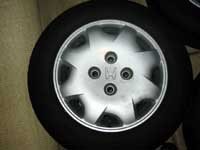 |
|
First step is to secure your car. Put it in Park for
an auto, and in first gear for a manual. Also engage the parking brake.
Next, get your jack and raise your car up. You can use the stock jack
to do this, but I recommend getting a heavier duty jack if you're
planning to do more than the occasional spare tire change.
In the 6th Gen. Accords, the stock jack and accessories are located
in the trunk on the right side. The actual jack is in the side compartment
while the wrench and crank are in a covered recess directly below
the jack. |
|
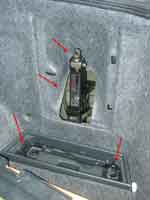 |
|
| To remove the jack, you'll notice that there's a bolt
running through it with a head you can hold on one end of it. Loosen
it (righty tighty, lefty loosey) and the jack will slowly collapse,
freeing it from the harness. Remove the jack and all your tools and
proceed to the wheel/tire you want to change. |
|
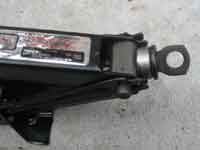 |
|
Most cars have specific reinforced jack points that
are marked under your car, on the jack or in your owner's manual.
Make sure you use these points so that you don't cause any damage
to your car. The Accord has thin metal support pieces that are about
3" long that stick down from your chassis that fit into a groove
on your jack. Slide your jack under these supports and tighten the
bolt until it is right under the support.
|
|
 |
|
|
One of your other tools will look like a long metal bar with a
hook/eye on one end. Attach the hook to the hole in the head of
the jack bolt.
Your other tool is a wrench (pictured), but it also has a hole in
the middle that matches the other end of the hook. Fit these two
pieces together and you've got your crank to turn the jack bolt.
|
|
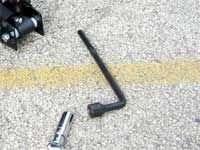 |
|
Start tightening the bolt so that the jack raises up
to the support, then starts raising the car. Keep tightening the bolt
until you've raised your car about an inch or two, but keeping your
tire in firm contact with the ground.
Now, detach the wrench from the hook and you can use it to loosen
the lug-nuts that attach your wheel to your car. |
|
|
|
If you have a floor jack, roll it into place under
the appropriate support. On my model, there is a "crown"
that you can rotate to best fit the car.
My jack has a removeable lever. Slip this into the appropriate hole
and rotate it to fasten it. Then start pumping it up and down to raise
the jack.
A floor jack is much simpler eh? Much heavier though... |
|
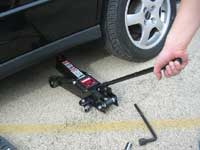 |
|
Chances are pretty good that the lugs will be extremely
tight unless they were hand-tightened before. I once actually broke
a wrench trying to loosen lugs that were tightened too much by the
dealer!
If you are having trouble removing the lugs, it may require your entire
body's weight to get the lugs off. To do this, put the wrench on so
that it stays horizontal when you let go. First try holding the end
with both hands and pushing down with the weight of your upper body.
|
|
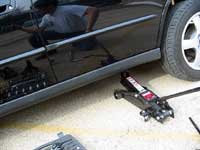 |
|
If this does not work, stand up and put one foot on
the end of the wrench and step on it, allowing it to support your
entire body's weight. If needed, you can jump on it to free the bolt,
but be careful to keep your balance at all times and don't knock your
car off the jack! If your entire wheel/tire turns instead of the bolt,
you may need to lower your jack so that it has enough traction to
hold it in place.
Your standard wrench is 1 foot long and if you weigh 100 pounds, you
are applying 100 ft/lbs of torque, which is more than the normal torque
necessary to install wheels. Therefore using your entire weight should
be more than enough to remove the bolt. If it is not, then you should
complain to whoever last mounted your wheels. |
|
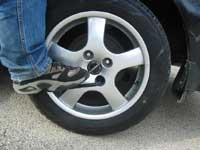 |
|
Working in a star pattern, loosen all the lugs just
a little. If you have 4 lugs, numbered in a circle, you would loosen
them in this order: 1-3-2-4. I fyou have 5 lugs, you would loosen
them in this order: 1-3-5-2-4. Loosen until they turn fairly easily
with the wrench.
Then return to the jack and raise it until the entire tire is no longer
touching the ground and you have about 1/2-1" of clearance. |
|
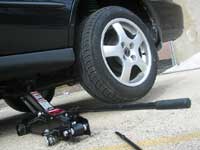 |
|
Continue to loosen the lugs in the same pattern. Once
they are loose enough to remove by hand, take them all off.
If you're using a socket set, it may be easier to remove the socket
from the wrench and just turn that instead of having to work with
the entire wrench or trying to fit your fingers into the holes.
Also, the bottom of your tire will have a tendency to tilt out as
you loosen the lugs. Here you can see me holding the tire in with
my foot as I unscrew them. |
|
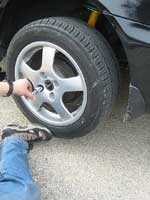 |
|
Now you can remove the wheel and tire. Grasp the wheel
by the spokes or the hold the oustide of the tire and lift up a little
until you can slide it off the bolts.
You may wish to do a basic visual inspection of your brakes while
your tires are off and clean the areas around the bolts with a cloth.
Simply check the condition of your brake discs or drums. A little
rust is normal, especially if it has rained recently, but keep your
eye out for cracks, large imperfections or large amounts of rust that
are eating through any parts. |
|
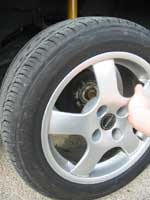 |
|
Preparation |
Installation
|
|
|
| |
|
|

